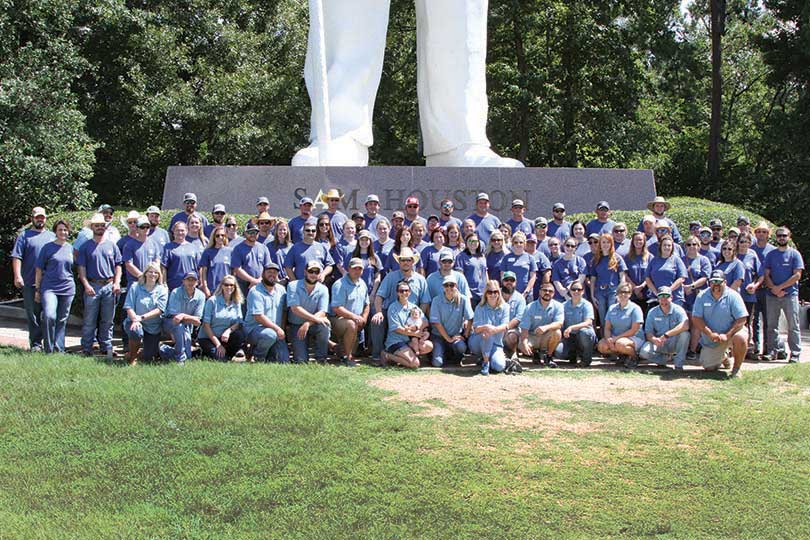By Julie Tomascik
Editor
High cotton, tall timber and the state’s working prison farms were part of the 2018 Young Farmer & Rancher Fall Tour held last weekend.
The annual two-day event exposes young farmers and ranchers to agriculture in a different part of the Lone Star State each year.
This year’s tour included stops in College Station and Huntsville.
“I think this is a great opportunity for us all to network, for people across the state to interact with others in different areas with different commodities, to see what concerns they have in their area and all come together for one purpose—agriculture,” Colt Christian, chair of Texas Farm Bureau’s (TFB) Young Farmer & Rancher Advisory Committee, said.
Nearly 100 young farmers and ranchers attended this year’s tour.
For Panhandle farmers Cade Wyatt and Tye Mason, it was a stark contrast to their farms about 500 miles away.
“In East Texas, it’s definitely a whole lot wetter, and there are definitely a lot more trees,” Mason, who grows cotton and hay in Garza County, said. “Where I’m from, you can see for miles and not see a single tree.”
The average rainfall for the East Texas area, according to presenters on the tour, is 40 inches. That’s a far cry from the average 18-20 inches for the Panhandle on a wet year.
And tours like this offer greater understanding of agriculture when similarities run short.
“There’s so much to learn, and even if it doesn’t exactly relate to what we do, we can take ideas back and put it into what we do in some sort of way,” said Wyatt, who grows cotton, hay, wheat and raises cattle in Childress County. “It’s a good learning experience. I think it’s important for us to be out and see a different industry.”
The group toured a timber farm outside of Huntsville, where their growing season is decades, not years. They also visited Steely Lumber Company to see how the timber is crafted into the final product.
“The timber industry is what I learned the most about, because I’ve never seen anything like that before,” Mason said. “This tour gets you out of your comfort zone and makes it where you can get out of your little bubble and see that people do more than just what’s done in your area.”
But even those who live in East Texas may not be as familiar with the area’s agricultural diversity. For Laura Downe and her family, raising cattle is their primary business.
“Many people are pretty removed from hands-on agriculture, just like I am with timber,” Downe, who ranches in Anderson County, said. “I know timber production is important, but I’ve never really experienced how it got to a table or a chair or whatever it’s made into.”
Downe noted the importance of consumers understanding the production chain that takes raw timber and transforms it to furniture, just like she wants consumers to understand the process required to get beef in the meat counter.
Many on the tour were cotton farmers, so a trip to Texas A&M AgriLife Extension’s Replicated Agronomic Cotton Evaluations (RACE) trials proved beneficial.
Dr. Gaylon Morgan, professor and Extension cotton specialist, discussed the trials and issues facing cotton production. He noted plastic contamination could put a stain on the industry and identified ways farmers and gins could work to reduce that contamination.
Properly lining up round bales to ensure the module truck doesn’t rip them, along with being on the lookout for false wrap, can help control contamination issues.
He also discussed boll weevil eradication efforts and chemical applications and trainings.
Cotton farmers, Morgan said, have a story to tell about efficiency and young farmers can be a part of those stories and conversations.
“We need people to know what we do in agriculture. I think we need to promote ourselves, which is something hard for people in agriculture to do,” Joshua Bell, a fourth-generation farmer who grows cotton, corn, peanuts and watermelons in Yoakum County and serves on TFB’s Young Farmer & Rancher Advisory Committee, said. “With people getting further removed from the farm, it’s our job to help them understand where their steak come from, where their cotton t-shirt comes from.”
Efficiency and sustainability were a common theme among the stops on the tour, especially at the Texas Department of Criminal Justi

